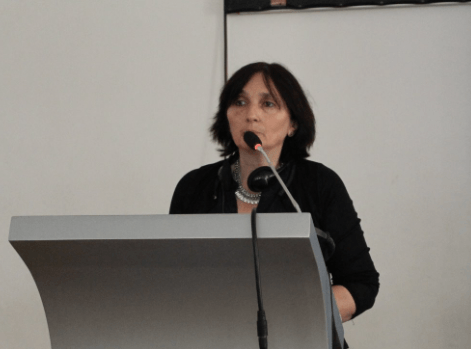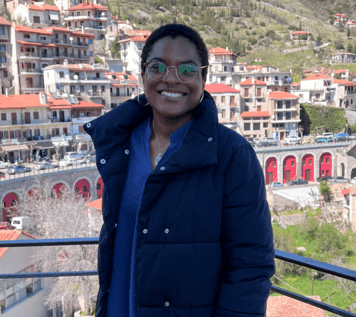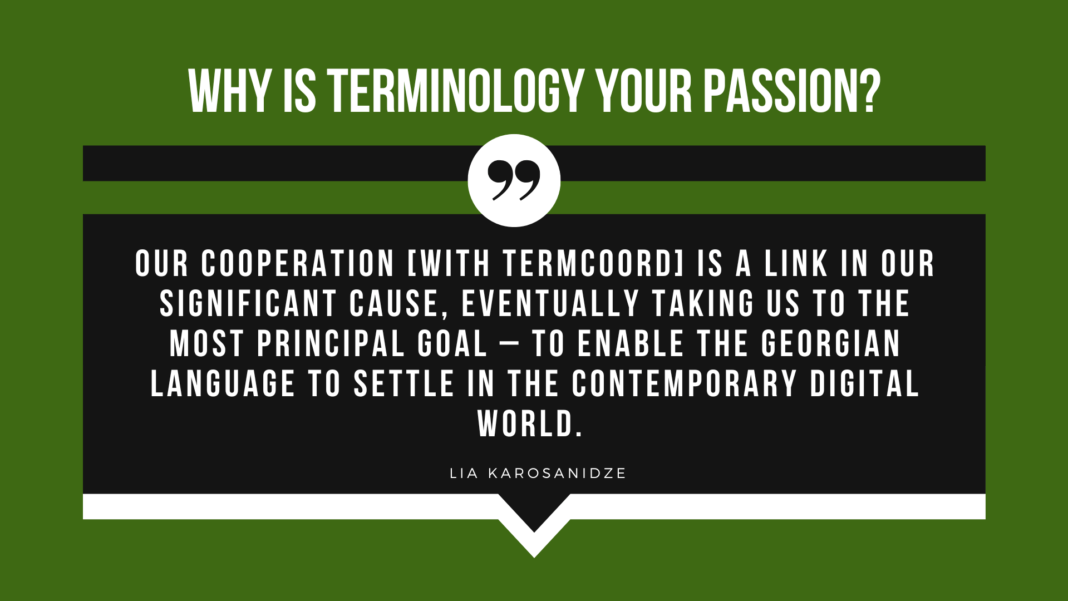
Lia Karosanidze is head of the Department of Translation Dictionaries and Scientific Terminology at TSU Arnold Chikobava Institute of Linguistics since 2006. She is the organizer of local and international conferences on terminology in Georgia since 2013. She is also the founder and editor of the journal Terminological Issues, and the head of the Vukol Beridze Association for Terminology of Georgia. A member of the Scientific Board of Arnold Chikobava Institute of Linguistics at Tbilisi State University, she is also the author of the lecture course History
of Georgian Terminology.
- Could you start by telling us about yourself and your academic background?
I am a specialist in classical languages. My initial scholarly interest has been associated with Dionysius Thrax’s grammar; I translated it into Georgian. I have studied Dionysius Thrax’s The Art of Grammar as well as very significant commentaries on it. My two monographs deal with tracking the traces of Greek grammatical theories and terms in Georgian manuscripts; it was owing to my studies of the problems in the texts that I got interested in terminology. Ancient Georgian translators’ (10th-12th cc.) translation and terminological methods still retain their relevance today. I frequently write and say that the ancient Georgian terminological school has taught me a lot, and it helps me enormously in coping with hardships in present-day Georgian terminology. I have designed two university courses; they are: “Greek Linguistic Theories and the History of Georgian Grammatical Thought” and “Georgian Terminology (History and Contemporaneity).” I am keen on terminology studies and keep on doing research in this direction; however, practical terminology work and organizational activities frequently prevent me from doing this.
- What drew you to the field of terminology and dictionary translation?
One can say that I was really lucky, after graduating from university in 1990, to have come to the Institute of Linguistics, specifically at the Department of Lexicology in the Georgian etymology group, where, as a specialist on classical languages, I was assigned to collect Georgian-Greek etymological data. These activities gave me enormous experience. In general, the hall, full of renowned Georgian linguists and where we early-career scholars held presentations, was a great school for me. The Institute of Linguistics has existed for more than 80 years. Most Georgian dictionaries, including explanatory and bilingual ones, terminological glossaries, spelling references, etc., were compiled here. Hence, my activities here enabled me to accumulate great experience. Since 2006, I have been in charge of the Department of Bilingual Dictionaries and Scientific Terminology. It was and still is a great responsibility for me.
- What are some of the projects that the Department of Scientific Terminology and Translating Dictionaries at the TSU Arnold Chikobava Institute of Linguistics is working on?
I have had to be in charge of the Department during very bad times. The Department of Terminology, which used to manage almost all terminology work in Georgia, was about to close. It was the period when research institutes either were closed or merged with a specific university (in 2010, the Institute of Linguistics lost its independent status and became a part of Tbilisi State University). Coordinated, managed terminology work no longer existed; it rather became a private venture. Meanwhile, we witnessed uncoordinated project funding; terminological projects were taken on by groups who had never done either theoretical or practical work in terminology. Parallel endeavors occurred frequently. Meanwhile, the need for terminology work increased more and more in the country. I believe that, in those circumstances, our department managed to maintain and develop terminology work. In 2013, aiming at restoring coordination of terminology work, we founded a conference that annually gathers specialists from various fields. In 2014, we founded the journal Terminological Issues. In 2015, we started working on the special program for the Georgian Term Bank and, in 2017, we presented its draft project to the public. In 2017, our department initiated the establishment of “The Vukol Beridze Association of Terminology of Georgia”, which joined two European terminology associations (EAFT and Infoterm). In 2018, we convened the first international conference “Terminology – Heritage and Modernity”. We also instituted a diploma for contributions to Georgian terminology (for instance, it was awarded to the creator of Georgian rugby terminology). Following our European colleagues’ suggestions, since 2019, we have translated significant European terminological standards; we are in the process of preparing to publish the Georgian Term Bank. We work on theoretical issues, on histories of church, linguistic, military, etc. terminologies, and on spelling norms. We publish papers and convene annual terminological conferences (local and international). We work on editing the terminological journal and conference proceedings. We supervise theses, deliver public lectures on terminology, and participate in TV and radio programs discussing problems of terminology. In a word, we do our best to further develop the traditional terminology work of the Institute of Linguistics.
- You organise the International Conference: Terminology – Heritage and Modernity in Georgia, which had its 3rd iteration this year, attended by TermCoord’s very own Rodolfo Maslias. What has your experience been like working on and participating in such a large project?
This year saw the third installment of the international conference “Terminology – Heritage and Modernity.” International conferences are of utmost importance for us, as every conference gives us an opportunity to grow closer with our European colleagues. This is how we got acquainted with some of them and then brought them to Georgia: Henrik Nilsson, President of EAFT; Christian Galinski, Director of Infoterm; Albina Auksorūtė, Director of the Institute of Lithuanian Language; etc. This year, Rodolfo Maslias visited Georgia for the first time. His principal message was significant for us: “our cooperation will be of mutual help in improving our practices and preparing in the best way the accession of Georgian to the family of EU official languages when Georgia will become a member of the European Union.” Alongside the keynote speech by Rodolfo Maslias at our conference, he delivered a lecture for the students of Tbilisi State University and Akaki Tsereteli State University, during which he provided a detailed account of the significance of our cooperation and discussed important issues, specifically:
· Multilingualism in the European Union,
· The cooperation of the European Institutions in terminology,
· Georgian as a candidate language and
· The projects of “Terminology without Borders” and the participation of Georgian Universities.
- The Georgia Term Bank is something that was discussed at the Conference. Could you tell us a little bit about the project, its goal, and your involvement in it?
Irrespective of the fact that in Georgia we have rich terminological data, and that there are terminological glossaries of various fields, it was only in 2015 that we first got an opportunity to digitize and put them together. The Georgian Term Bank (GTB) is developed based on academic glossaries compiled under the guidance of the Department of Scientific Terminology, Arnold Chikobava Institute of Linguistics, and TSU. Alongside the Institute of Linguistics, a number of state institutions are involved in the creation and development of the Georgian Term Bank: the Ministry of Defense of Georgia, the National Library of the Parliament of Georgia, the Vukol Beridze Association of Terminology of Georgia, and the Institute TECHINFORM of the Georgian Technical University.
The Georgian Term Bank is different from its European counterparts, primarily in that Europeans built a database of normative terminological glossaries while in Georgia, owing to the spared years, we have to impose distinct functions on it. The Georgian Term Bank should, itself, become a foundation for normative terms. Recently in Georgia, we are facing an increase in synonymous and frequently just transliterated terms; with respect to this circumstance, in the Georgian Term Bank, we should primarily explore Georgian field-specific terminologies, all the synonyms, and, in order to overcome the diversity, establish normative terms. Activities in this direction have already commenced and we are establishing Georgian field-specific normative terms in collaboration with professionals from various industries. Eventually, the Georgian Term Bank will put together the entire Georgian terminological stock, with glossaries compiled under the guidance of the Institute of Linguistics. I believe that the Georgian Term Bank will enable us to restore correct terminology work in Georgia. As it is stated in the UNESCO guidelines, “[i]n terminology planning and in particular in the framework of a national terminology policy, a national terminology database often is used as one of the primary tools for the implementation of that policy” (Guidelines for Terminology Policies. UNESCO, 2005).
- Your university is already participating in terminology projects coordinated by TermCoord. How important is the academic cooperation project “Terminology without Borders” for Georgia?
It is a great responsibility for us to cooperate with IATE and to bring Georgian terms to the European databases. We started our activities with the project Food; researchers of the Department of Terminology, Institute of Linguistics, and professors (under the management of Prof. Manana Rusieshvili) from the Department of English Philology, Tbilisi State University, already planned all the details, translated into Georgian the instruction for introducing Georgian entries into IATE database, compiled the scientific bibliography and identified thematic groups. The data available in the Georgian Term Bank provides an opportunity to coordinate our cooperation with IATE. Soon, Akaki Tsereteli State University (Kutaisi) will join us and it will be our joint work, including the completion of the Georgian Term Bank with more data and the introduction of Georgian terms agreed with IATE. Many thanks to Mr. Rodolfo Maslias for supporting Georgian terminology work. I hope that our cooperation will continue in the future, thus enabling us to implement certain ideas.
Our cooperation is a link in our significant cause, eventually taking us to the most principal goal – to enable the Georgian language to settle in the contemporary digital world.
- Throughout your many years of experience in the field of terminology, what are some things that have surprised you while doing your research?
Scientific work is a difficult endeavor; however, it brings enormous joy to the researcher. Discoveries and innovations delight every scholar greatly, myself included. In recent years, the greatest, and most significant, activity for me has been to take care of the development of the Georgian Term Bank. When we started working on it, many people thought that it was an impossible mission; besides, it was a novelty, and the scholarly public failed to adequately conceptualize our objective. The term ‘Georgian Term Bank’ appeared for the first time in Georgian scholarly literature. Therefore, I was particularly happy when the query system of the Georgian Term Bank was developed and presented to the audience. Even now, I feel very happy when new entries are introduced into it.
- How has our increasingly digital society affected linguistic research, both globally and specifically in Georgia?
The digital era has brought certain benefits to mankind; I mean the rapprochement of nations and cultures. Up-to-date technologies have given us an opportunity to receive more information, and to get to know each other’s cultures and traditions better. It was during this era when the issue of taking care of languages and their technological development was raised. We are given a unique opportunity to talk to each other not in a third language but rather in our own one. This is what requires particular, intensive activities, posing different problems to lexicology and terminology. The primary mission is to provide a complete description of the notions of your own language. We have excellent lexicographic heritage, dictionaries, and lexicographic studies, and they have to be necessarily edited and digitized. I believe that the compilation of a comprehensive Georgian-English thematic dictionary and the publication of the Georgian Term Bank are the most urgent and significant issues in present-day Georgia. Europe has gradually transferred to the digital era; they have been concerned with this since the 1980s-90s. As for Georgia, we missed the opportunity due to the hard political and economic situation. Thus, we Georgian linguists have to compensate for the time lost. There is one thing I am sure of: Georgia has always been part of the educated and civilized world. It will stay this way. We will make it, by all means.
- Georgia is a country that is involved in a lot of interesting terminology work. What are your hopes for the future of terminology in the country?
I am particularly happy to see early-career scholars taking part in terminology work. Every year, when we organize a terminological conference, I am concerned with one thing: whether early-career scholars will come or not. Fortunately, their numbers increase every year. This year they made presentations and surprised me with how well they know their professional fields and how concerned they are with diversity and the inadequacy of terms. They speak several languages, they are well aware of terminological glossaries published either in Georgian or in other languages and, importantly, they have very valuable suggestions. These make me hopeful and make me believe in the future. It is important to continue studies; without terminological studies, no practical work will be complete. Therefore, I give great importance to terminological studies for the development of Georgian terminology and its future.
It is also important to have close relationships with international scholars. For the future of the Georgian language, and Georgian terminology, it is of utmost importance to educate young scholars, and this is what the government should take particular care of.
- How important will terminology and lexicography be to the process of Georgian becoming, in the future, an official EU language?
The digital era has brought different challenges to lexicography and terminology in Georgia. I frequently state that, unfortunately, Georgia did not manage to do what Lithuania could following the break-up of the Soviet Union; specifically, they managed to switch from the Soviet terminology standards to the European ones, develop their Term Bank, and introduce the Lithuanian language into the European terminological database. The Institute of the Lithuanian Language manages terminology work in the country, thus excluding parallel endeavors. In Georgia, a new terminological center can be founded at any time; a number of individuals make use of the lack of terminology policy and try to earn some benefits for themselves. This is what happens in countries where terminology work is not managed and is not determined. This is the greatest challenge in present-day Georgia. That is why we believe that the Institute of Linguistics in Georgia should be as independent as the Institute of the Lithuanian language. The development of this traditional research institute and the recruitment of young professionals will make beneficial changes in Georgia, thus highlighting its role as an organization responsible for the development of terminology and language at large. No more time must be lost. The policy of terminology management should be established as soon as possible, and all the resources, human and financial, should be joined to serve the principal cause – the establishment of Georgian in the EU family of languages.

Interviewed by Margaly Monelus
Born in the United States of America in 1996, she is currently taking part in the Master in Learning and Communication in Multilingual and Multicultural Contexts at the University of Luxembourg. She holds a bachelor in sociology from Fairleigh Dickinson University and has spent 4 years as a native English teacher, living and working in South Korea and France. She hopes to help further research in language acquisition, and discover new ways in making language learning more efficient in both the classroom and at home. In her free time, she enjoys learning new languages and improving her vegan baking abilities.

